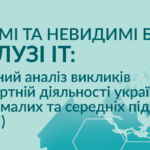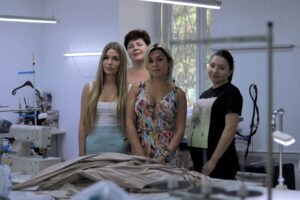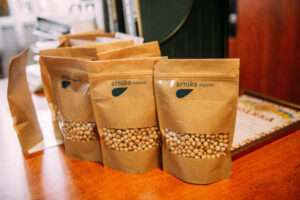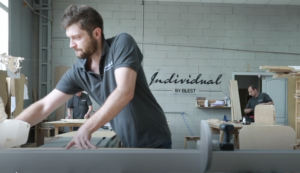
For more than ten years, the Timi-Tex company from Chernihiv has been producing good-quality children’s clothes. In 2013, despite all the political and economic challenges, Olesya Tymoshyk, with her husband Anatoliy, assumed the risks and bought the other parts of the business from their partners, starting, in fact, a family company.
Timi-Tex specializes in making clothes for babies up to one year old. Besides, there is a line for primary school pupils. «Before, we also produced children’s bed linen, for which fabric was bought from a Donetsk company. After the occupation, linen production was suspended”, Olesya says.
The company’s products are mainly sold through stores throughout Ukraine.
Since 2017, Timi-Tex started to increase its production. Last year, 2019, was quite successful for the company, as it managed to double its staff – from 8 to 16 sewists, and sales grew by more than 25% compared to 2018.
SheforShe Mentorship Program
In the fall of 2019, with the assistance of the Chernihiv Chamber of Commerce and Industry, a partner of the CUTIS Project, Olesya Tymoshyk learned about the SheforShe Mentorship Program for women entrepreneurs.
“The business was gradually developing, but I had the feeling that we were bogged down. Changes were needed, but which ones? There was no understanding of what steps to take, where to go. I wanted to reach a new level. That is why I have agreed to the invitation to join the CUTIS mentorship program,” Ms. Tymoshyk recalls.
Also, the great reputation and professionalism of Mentor Maria Terekhova, Managing Partner of Trade House New Fashion Zone, who already had a successful experience in promoting Ukrainian light industry products, played an important role. “I already knew Maria, not very well, but I understood her being a high-level specialist. Therefore, I simply could not miss this opportunity,” continues the Timi-Tex co-owner.
During the first meeting, Maria visited the enterprise in Chernihiv, where she discussed in detail the specifics of its work and the goals that Olesya set for herself in the mentorship program.
“In a few days, Maria offered us her vision of further business development with a focus on export development and identified some points that would need improvement, in particular, to increase our share of online sales. I was also very impressed with her approach to work: after each discussion, Maria sent a “protocol” with questions that were raised and the next steps to be taken. Everything is straight and clear”, Olesya says.
Introduction of changes
The first thing we decided to work on was the renewal of the baby product range. “After communicating with Maria, I studied the sites of European manufacturers and realized what we need to modernize in our collection. Changes have brought to life our the summer collection”, Olesya says.
Another critical point is the expansion of online sales channels. With Maria’s assistance, cooperation with Garna mama’s online clothing store has resumed. Negotiations have also begun with other online platforms (including well-known Ukrainian e-commerce platforms Rozetka and Lamoda).
During the mentorship program, Olesya also managed to launch the company’s website with an English version, prepare a new catalogue and company profile containing essential information for potential buyers (about the company, capacities, product mix, etc.), and calculate an updated pricelist.
The next stage of collaboration was the preparation for participation in the international exhibition Apparel Textile Sourcing in Paris.
New experience
For several years, Olesya and her team have been thinking about exporting to foreign markets, but no special steps were taken in that direction.
The decision of the CUTIS project to support the SheforShe program participants’ visit to the exhibition in Paris has become a particular catalyst for accelerating the implementation of changes in the Timi-Tex company. “For the exhibition, we promptly sewed some products by new patterns, completed a new catalogue, price list and profile,” Olesya recalls.
“The exhibition was not as large as before because many participants (especially Chinese companies) could not get to Paris due to the Coronavirus.
For me, however, that was a unique opportunity to at least feel the needs of the market and the requirements for manufacturers, and at the most – to communicate with potential foreign customers. There were even African companies that liked our product range,” says Ms. Tymoshyk.
One of the conclusions after attending the exhibition – it is difficult for Ukrainian clothing manufacturers, including children’s clothes, to enter foreign markets under their own brand. “We were approached by European buyers and retail chain owners, discussed the possibilities to start production under private labels. It would be a new and interesting experience for us. I hope that cooperation will nevertheless be established after the end of the Coronavirus epidemic”, Olesya continues.
Onward to new achievements
The mentorship program helped Olesya approach the issue of further business development more systematically.
First, she realized that there was no way to enter a foreign market with the existing capacities because sales in the domestic market would be affected in that case. “We even looked for the premises nearby to enlarge the production facility, planned to increase the number of employees to 26 in 2020 and started to implement the Grazia CAD system to automate the design of clothing.
Due to the Coronavirus, however, all our plans are still on pause”, the entrepreneur says.
Second, Olesya found a Ukrainian fabric manufacturer. “If we want to export clothing, for example, to Canada under CUFTA without paying tariffs, then our products must be “of Ukrainian origin.” Usually, we buy Turkish fabrics, so we had to find a Ukrainian good-quality manufacturer. Thanks to Maria, we have agreed to cooperate with the GOLDI company”, Ms. Tymoshyk continues.
Third, she understood the need and benefits for international certification of the production. “At the exhibition in Paris, potential partners asked me about the OEKO-TEX certification. It is issued for a certain period of time and it costs a lot for a small business. We need it, however, for export development. Therefore, we will revisit this issue after the full resumption of our operations after the quarantine is over”, explained the Timi-Tex co-owner.
Olesya notes: “Participation in the mentorship program also contributed to my personal growth as a manager and allowed me to establish new exciting contacts. Thanks to CUTIS, I met other program members. In particular, at the moment, we cooperate with Yevhenia Lukash from Kherson by making protective masks. I do not think such cooperation would have been possible without the project.
We could potentially buy fabrics together and have other options for cooperation. The main thing is that we trust each other. We no longer consider each other as competitors, but as partners. And that’s a huge advantage”.
Author – Tetiana Riasna




